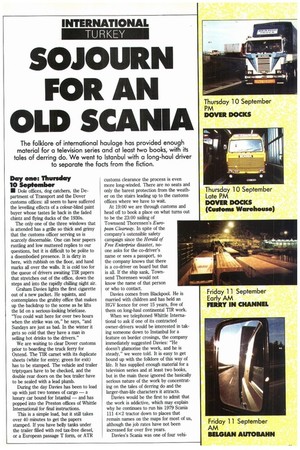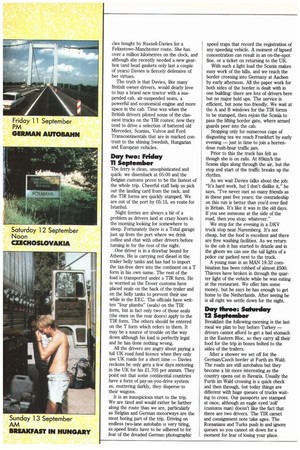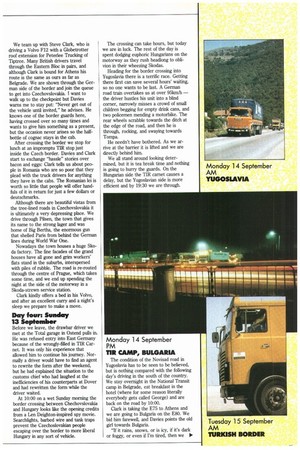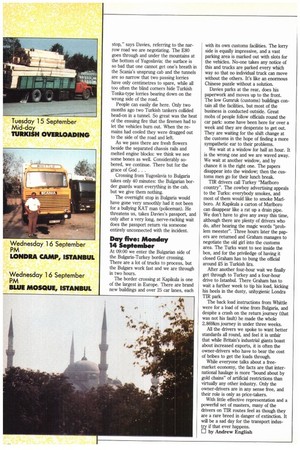SOJOURN FOR AN OLD SCANIA
Page 31

Page 32

Page 33

Page 34

If you've noticed an error in this article please click here to report it so we can fix it.
The folklore of international haulage has provided enough material for a television series and at least Iwo books, with its tales of derring do. We went to Istanbul with a long-haul driver to separate the facts from the fiction.
Day one: Thursday 10 September
• Dole offices, dog catchers, the Department of Transport and the Dover customs offices: all seem to have suffered the levelling effects of a colour-blind paint buyer whose tastes lie back in the faded chintz and flying ducks of the 1930s.
The only one of the three windows that is attended has a grille so thick and grimy that the customs officer serving us is scarcely discernable. One can hear papers rustling and low muttered replies to our questions, but it is difficult to be polite to a disembodied presence. It is dirty in here, with rubbish on the floor, and hand marks all over the walls. It is cold too for the queue of drivers awaiting TIR papers that stretches out of the office, down the steps and into the rapidly chilling night air.
Graham Davies lights the first cigarette out of a new packet. He squints, and contemplates the grubby office that makes up the backdrop to the scene as he lifts the lid on a serious-looking briefcase. "You could wait here for over two hours when the strike was on," he says, "and Sundays are just as bad. In the winter it gets so cold that they have a man in selling hot drinks to the drivers."
We are waiting to clear Dover customs prior to boarding the truck ferry for Ostend. The TIR carnet with its duplicate sheets (white for entry; green for exit) has to be stamped. The vehicle and trailer triptyques have to be checked, and the double rear doors on the box trailer have to be sealed with a lead plumb.
During the day Davies has been to load up with just two tonnes of cargo — a luxury car bound for Istanbul — and has popped into the Preston offices of Whittle International for final instructions.
This is a simple load, but it still takes over 40 minutes to get the papers stamped. If you have belly tanks under the trailer filled with red tax-free diesel, or a European passage T form, or ATR customs clearance the process is even more long-winded. There are no seats and only the barest protection from the weather on the stairs leading up to the customs offices where we have to wait.
At 19:00 we are through customs and head off to book a place on what turns out to be the 23:00 sailing of Townsend Thorensen's European Clearway. In spite of the company's ostensible safety campaign since the Herald of Free Enterprise disaster, noone asks for the co-driver's name or sees a passport, so the company knows that there is a co-driver on board but that is all. If the ship sank, Townsend Thorensen would not know the name of that person or who to contact.
Davies comes from Blackpool. He is married with children and has held an HGV licence for over 15 years, five of them on long-haul continental TIR work.
When we telephoned Whittle International to ask if one of its contracted owner-drivers would be interested in taking someone down to Instanbul for a feature on border crosings, the company immediately suggested Davies: "He doesn't glamorise the work, and he is steady," we were told. It is easy to get bound up with the folklore of this way of life. It has supplied enough material for a television series and at least two books, but in the main these ignored the basically serious nature of the work by concentrating on the tales of derring do and the larger-than-life characters it attracts.
Davies would be the first to admit that the work is addictive, which may explain why he continues to run his 1979 Scania 111 4x2 tractor down to places that remain names on the maps for most of us, although the job rates have not been increased for over five years.
Davies's Scania was one of four vehi des bought by Russell-Davies for a Felixstowe-Manchester route. She has over a million kilometres on the clock, and although she recently needed a new gearbox (and head gaskets only last a couple of years) Davies is fiercely defensive of her virtues.
The truth is that Davies, like many British owner-drivers, would dearly love to buy a brand new tractor with a suspended cab, air-suspended seats, a powerful and economical engine and more space in the cab. Time was when the British drivers piloted some of the classiest trucks on the TIR routes; now they tend to drive a selection of battered old Mercedes, Scanias, Volvos and Ford Transcontinentals that are in marked contrast to the shining Swedish, Hungarian and European vehicles.
Day Iwo: Friday 11 September
The ferry is clean, unsophisticated and quick: we disembark at 05:00 and the Belgian customs prove to be the fastest of the whole trip. Cheerful staff help us pick out the landing card from the rack, and the TIR forms are quickly stamped. We are out of the port by 05:15, en route for Istanbul.
Night ferries are always a bit of a problem as drivers land at crazy hours in the morning looking for somewhere to sleep. Fortunately there is a Total garage just up from the port where we drink coffee and chat with other drivers before turning in for the rest of the night.
One driver is in a drawbar bound for Athens. He is carrying red diesel in the trailer belly tanks and has had to import the tax-free dery into the continent on a T form in his own name. The rest of the load is transported under a TIR form. He is worried as the Dover customs have placed seals on the back of the trailer and on the belly tanks to prevent their use while in the EEC. The officials have written "four plumbs" (seals) on the TIR form, but in fact only two of those seals (the ones on the rear doors) apply to the TIR form. The others should be entered on the T form which refers to them. It may be a source of trouble on the way down although his load is perfectly legal and he has done nothing wrong.
All the drivers are angry about paying a full UK road fund licence when they only use UK roads for a short time — Davies reckons he only gets a few days motoring in the UK for his 21,705 per annum. They point out that some continental countries have a form of pay-as-you-drive system as, muttering darkly, they disperse to their wagons.
It is an inauspicious start to the trip. We are tired and would rather be further along the route than we are, particularly as Belgian and German motorways are the most boring part of the trip. Driving on endless two-lane autobahn is very tiring, as speed limits have to be adhered to for fear of the dreaded German photographic speed traps that record the registration of any speeding vehicle. A moment of lapsed concentration can result in an on-the-spot fine, or a ticket on returning to the UK.
With such a light load the Scania makes easy work of the hills, and we reach the border crossing into Germany at Aachen by early afternoon. All the paper work for both sides of the border is dealt with in one building: there are lots of drivers here but no major hold ups. The service is efficient, but none too friendly. We wait at the A and B windows for the TIR forms to be stamped, then rejoin the Scania to pass the lifting border gate, where armed guards peer into the cab.
Stopping only for numerous cups of disgusting tea we reach Frankfurt by early evening — just in time to join a horrendous rush-hour traffic jam.
Prior to this the truck has felt as though she is on rails. At 851an/11 the Scalia slips along through the air, but the stop and start of the traffic breaks up the rhythm.
As we wait Davies talks about the job: "It's hard work, but I don't dislike it," he says. "I've never met so many friends as in these past five years; the comradeship on this run is better than you'd ever find in Britain. It's like it was in the old days. If you see someone at the side of the road, then you stop; whatever."
We stop for the evening in a DKV truck stop near Nuremberg. It's not cheap, but the food is excellent and there are free washing facilities. As we return to the cab it has started to drizzle and in the gloom we can see the tail lights of a police car parked next to the truck.
A young man in an MAN 19.32 combination has been robbed of almost 2500. Thieves have broken in through the quarter light of the vehicle while he was eating at the restaurant. We offer him some money, but he says he has enough to get home to the Netherlands. After seeing he is all right we settle down for the night
Day three: Saturday 12 September
Breakfast the following morning is the last meal we plan to buy before Turkey — drivers cannot afford to get a bad stomach in the Eastern Bloc, so they carry all their food for the trip in boxes bolted to the sides of the trailers.
After a shower we set off for the German/Czech border at Furth im Wald. The roads are still autobahns but they become a bit more interesting as the country opens out in Bavaria. Usually the Furth im Wald crossing is a quick check and then through, but today things are different with huge queues of trucks waiting to cross. Our passports are stamped at once, although an eagle eyed 'zoll' (customs man) doesn't like the fact that there are two drivers. The TIR carnet and consignment note take ages. The Romanians and Turks push in and ignore queues so you cannot sit down for a moment for fear of losing your place. We team up with Steve Clark, who is driving a Volvo F12 with a Globetrotter roof extension for Peterlee Trucking of Tiptree. Many British drivers travel through the Eastern Bloc in pairs, and although Clark is bound for Athens his route is the same as ours as far as Belgrade. We are shown through the German side of the border and join the queue to get into Czechovslovakia. I want to walk up to the checkpoint but Davies warns me to stay put: "Never get out of the vehicle until invited," he advises. He knows one of the border guards here, having crossed over so many times and wants to give him something as a present, but the occasion never arises so the halfbottle of cognac stays in the cab.
After crossing the border we stop for lunch at an impromptu TIR stop just inside the Czech border. Davies and Clark start to exchange "hassle" stories over bacon and eggs: Clark tells us about people in Romania who are so poor that they plead with the truck drivers for anything they have in the cabs. The Romanian lei is worth so little that people will offer handfuls of it in return for just a few dollars or deutschmarks.
Although there are beautiful vistas from the tree-lined roads in Czechovslovalda it is ultimately a very depressing place. We drive through Pilsen, the town that gives its name to the strong lager and was home of Big Bertha, the enormous gun that shelled Paris from behind the German lines during World War One.
Nowadays the town houses a huge Skoda factory. The fine facades of the grand houses have all gone and grim workers' flats stand in the suburbs, interspersed with piles of rubble. The road is re-routed through the centre of Prague, which takes some time, and we end up spending the night at the side of the motorway in a Skoda-strewn service station.
Clark kindly offers a bed in his Volvo, and after an excellent curry and a night's sleep we prepare to make a move.
Day four: Sunday 13 September
Before we leave, the drawbar driver we met at the Total garage in Ostend pulls in. He was refused entry into East Germany because of the wrongly-filled in TIR Carnet. It was only his experience that allowed him to continue his journey. Normally a driver would have to find an agent to rewrite the form after the weekend, but he had explained the situation to the customs chief who had laughed at the inefficiencies of his counterparts at Dover and had rewritten the form while the driver waited.
At 10:00 on a wet Sunday morning the border crossing between Chechovslovalda and Hungary looks like the opening credits from a Len Deighton-inspired spy movie. Searchlights, barbed wire and tank traps prevent the Czechoslovakian people escaping over the border to more liberal Hungary in any sort of vehicle. The crossing can take hours, but today we are in luck. The rest of the day is spent dodging euphoric Hungarians on the motorway as they rush headlong to oblivion in their wheezing Skodas.
Heading for the border crossing into Yugoslavia there is a terrific race. Getting there first can save several hours' waiting, so no one wants to be last. A German road train overtakes us at over 951cm/h — the driver hustles his unit into a blind corner, narrowly misses a crowd of small children begging for empty drink cans, and two policemen mending a motorbike. The rear wheels scrabble towards the ditch at the edge of the road, and then he is through, rocking, and swaying towards Tompa.
He needn't have bothered. As we arrive at the barrier it is lifted and we are directly behind him.
We all stand around looking determined, but it is tea break time and nothing is going to hurry the guards. On the Hungarian side the TIR carnet causes a delay, but the Yugoslavian side is more efficient and by 19:30 we are through.
Monday 14 September PM TIR CAMP, BULGARIA
The condition of the Novisad road in Yugoslavia has to be seen to be believed, but is nothing compared with the following day's driving in the south of the country. We stay overnight in the National Transit camp in Belgrade, eat breakfast in the hotel (where for some reason literally everybody gets called George) and are back on the road by 10:00.
Clark is taking the E75 to Athens and we are going to Bulgaria on the E80. We bid him farewell, and Davies points the old girl towards Bulgaria.
"If it rains, snows, or is icy, if it's dark or foggy, or even if I'm tired, then we IP. stop," says Davies, referring to the narrow road we are negotiating. The E80 goes through and under the mountains at the bottom of Yugoslavia; the surface is so bad that one cannot get one's breath in the Scania's unsprung cab and the tunnels are so narrow that two passing lorries have only centimetres to spare, while all too often the blind corners hide Turkish Tonka-type lorries bearing down on the wrong side of the road.
People can easily die here. Only two months ago two Turkish tankers collided head-on in a tunnel. So great was the heat of the ensuing fire that the firemen had to let the vehicles burn out. When the remains had cooled they were dragged out to the side of the road and left.
As we pass there are fresh flowers beside the separated chassis rails and melted engine blocks: we think we see some bones as well. Considerably sobered, we continue. There but for the grace of God. .
Crossing from Yugoslavia to Bulgaria takes only 40 minutes: the Bulgarian border guards want everything in the cab, but we give them nothing.
The overnight stop in Bulgaria would have gone very smoothly had it not been for a bullying KAT man (policeman). He threatens us, takes Davies's passport, and only after a very long, nerve-racking wait does the passport return via someone entirely unconnected with the incident.
Day five: Monday 14 September
At 09:00 we enter the Bulgarian side of the Bulgaria-Turkey border crossing. There are a lot of trucks to process, but the Bulgars work fast and we are through in two hours.
The border crossing at Kapikula is one of the largest in Europe. There are brand new buildings and over 25 car lanes, each with its own customs facilities. The lorry side is equally impressive, and a vast parking area is marked out with slots for the vehicles. No-one takes any notice of this and trucks are parked every which way so that no individual truck can move without the others. It's like an enormous Chinese puzzle without a solution.
Davies parks at the rear, does his paperwork and moves up to the front. The low Gumruk (customs) buildings contain all the facilities, but most of the business is conducted outside. Great mobs of people follow officials round the car park: some have been here for over a week and they are desperate to get out. They are waiting for the shift change at the customs in the hope of finding a more sympathetic ear to their problems.
We wait at a window for half an hour. It is the wrong one and we are waved away. We wait at another window, and by chance it is the right one. The papers disappear into the window; then the customs men go for their lunch break.
TIR drivers call Turkey "Marlboro country". The cowboy advertising appeals to the Turks: everybody smokes, and most of them would like to smoke Marlboro. At ICapikula a carton of Marlboro can disappear like a rat up a drain pipe. We don't have to give any away this time, although there are plenty of drivers who do, after hearing the magic words "problem meester". Three hours later the papers are returned and Graham manages to negotiate the old girl into the customs area. The Turks want to see inside the box, and for the priviledge of having it closed Graham has to bung the official around 25 in Turkish lira.
After another four-hour wait we finally get through to Turkey and a four-hour drive to Istanbul. There Graham has to wait a further week to tip his load, kicking his heels in the dusty, unhygienic Londra TIR park.
The back load instructions from Whittle were for a load of wine from Bulgaria, and despite a crash on the return journey (that was not his fault) he made the whole 2,869km journey in under three weeks.
All the drivers we spoke to want better standards all round, and feel it is unfair that while Britain's industrial giants boast about increased exports, it is often the owner-drivers who have to bear the cost of bribes to get the loads through.
While everyone talks about a freemarket economy, the facts are that international haulage is more "bound about by gold chains" of artificial restrictions than virtually any other industry. Only the owner-drivers are in any sense free, and their role is only as price-takers.
With little effective representation and a powerful set of masters, many of the drivers on TIR routes feel as though they are a rare breed in danger of extinction. It will be a sad day for the transport indus if that ever happens.
DI by Andrew English
















































































